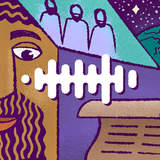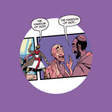The BibleProject podcast features detailed conversations between Tim and Jon and occasional guests, inviting you to explore the biblical theology behind each animated video and series we create.

In the final nine verses of his letter, Jude transitions from warning about corrupt members to instructing the faithful. In so many words, he encourages them to keep pressing on as the living temple of God’s Spirit and love. Jude also guides them in how to care for the doubting and deceived in their community, while taking necessary caution for their own holiness. And he concludes with confidence in God’s ability to protect the Church and make them stand as blameless priests, all to the praise, honor, and majesty of God. In this episode, Jon and Tim finish our series in this short but powerful letter.

In verses 11-16, Jude continues warning his Jewish messianic audience about deceptive, immoral people infiltrating their house churches. He compares them to three characters from the Hebrew Bible—Cain, Balaam, and Korah—who choose rebellion for themselves and lead others astray. Next, he compares the corrupt church members to a series of images from Scripture, including selfish shepherds, rainless clouds, and wandering stars. In this episode, Jon and Tim continue exploring Jude’s dense prose, where he seamlessly weaves together allusions to the Hebrew Bible and Second-Temple period literature into a piercing critique of imposters within a community of disciples.

In verses 5-7, Jude warns a Jewish Messianic community about a group of people in their midst who live without moral restraint and reject Jesus’ authority. After comparing them to a series of human and angelic rebels in the Hebrew Bible, Jude then calls out the corrupt church members in verses 8-10 as ones who “slander the glorious-ones,” referring to angels. What is Jude talking about, and why would slandering spiritual beings be considered offensive? In this episode, Jon and Tim explore the Hebrew Bible and Second-Temple period apocryphal literature to understand the unique role and revered status of angels among 1st-century Jewish people.

After the letter’s opening appeal, Jude (or Judah) begins warning corrupt members of a Jewish messianic church community who cast off restraint and live openly immoral lives. He does so with an ancient rhetorical technique found in both the Hebrew Bible and the Dead Sea Scrolls. Jude shares three stories of rebellion in the Hebrew Bible: the spies fearful of the promised land in Numbers 13-14, the “sons of God” in Genesis 6, and the inhabitants of Sodom and Gomorrah in Genesis 19. Then he draws comparisons to the corrupt church members, promising they’ll receive the same judgment. Why does Jude write this way about the moral crisis in a church? What is he trying to communicate? In this episode, Jon and Tim explore verses 5-8, unpacking the dense biblical references and what they would have meant to Jude and his audience.

In the introduction to his letter, Jude (or Judah) shares that he had hoped to write about the community’s “shared rescue” of salvation in Jesus. But urgent problems in the church forced him to send a warning instead. He calls his readers to “contend for the faith once for all handed down,” describing this faith as made up of trust in the story of Jesus and loyalty to Jesus’ way of life. But what is the threat Jude wants them to guard against, and how does he describe it? In this episode, Jon and Tim break down the introduction to the letter of Jude, revealing a multitude of Hebrew Bible hyperlinks and a method of reading Scripture as unified meditation literature.

Jude is one of the shortest writings in the New Testament. It comes from one of Jesus’ own brothers (or cousins, or stepbrothers, depending on the tradition). Written in the early years of the Jesus movement, the letter addresses a Jewish community in Jerusalem or Galilee, made up of disciples who likely grew up with Jesus and knew his family. Jude (or Judah in Hebrew or Judas in Greek) is deeply rooted in the Hebrew Bible. His writing shows these roots through consistent biblical language and tons of hyperlinks. But who was Jude, and what do we know about his family and ancestors? In this episode, Jon and Tim introduce the background of this short letter and the larger world surrounding its author.

As we wrap up 2025, we’re celebrating two big milestones: 10 years and 500 episodes of exploring the Bible together! To mark the occasion, we’re strolling down memory lane to see how it all began. How does a side project recorded in a closet turn into a decade-long global conversation? In this episode, producer Lindsey Ponder interviews Jon, Tim, and other team members about how the show came to be, its growth over time, and how it continues to shape us, even as it helps hundreds of thousands of listeners experience the Bible as a unified story that leads to Jesus.

In our next-to-last episode of 2025, Tim, Jon, and BibleProject CEO, Steve Atkinson, review all the resources we released this year, while reflecting on the bigger worldwide movement of people reading the Bible as a unified story that leads to Jesus. The guys then share about some of what’s coming up next for BibleProject in 2026.

We’re ending our short Advent series with a reflection on love. In the Hebrew Bible, the word “ahavah” involves faithfulness to God and living by his wisdom, but it also means showing practical care to others—especially the vulnerable. Jesus views this love for God and neighbor as the greatest command, and he expands it to be indiscriminate, radical kindness and generosity even toward our enemies. The New Testament authors were so blown away by this kind of love that they adopted an obscure Greek word for love, “agape,” and redefined it to be a self-giving, sacrificial love that Jesus demonstrates in his life, teaching, death, and resurrection. In this episode, Jon and Tim explore the main biblical words for love, showing how the story of Advent characterizes agape as God’s own essence and our calling.

In the third week of Advent, we’re reflecting on joy. Joy’s not only a feeling based on circumstances but a rich biblical theme expressed in song, celebration, and even shouts of delight in all seasons of life. In the Hebrew Bible, words for joy appear most often in Psalms and describe communal feasts, temple offerings, and weddings. In these moments, joy is about remembering God’s goodness in the past and anticipating his future rescue. The New Testament continues this story, with Luke and Acts in particular overflowing with joy at the arrival of the Messiah, the outpouring of the Holy Spirit, and the resurrection of Jesus. In this episode, Jon and Tim find the theme of joy everywhere in Scripture, even before God’s work is ultimately finished.





